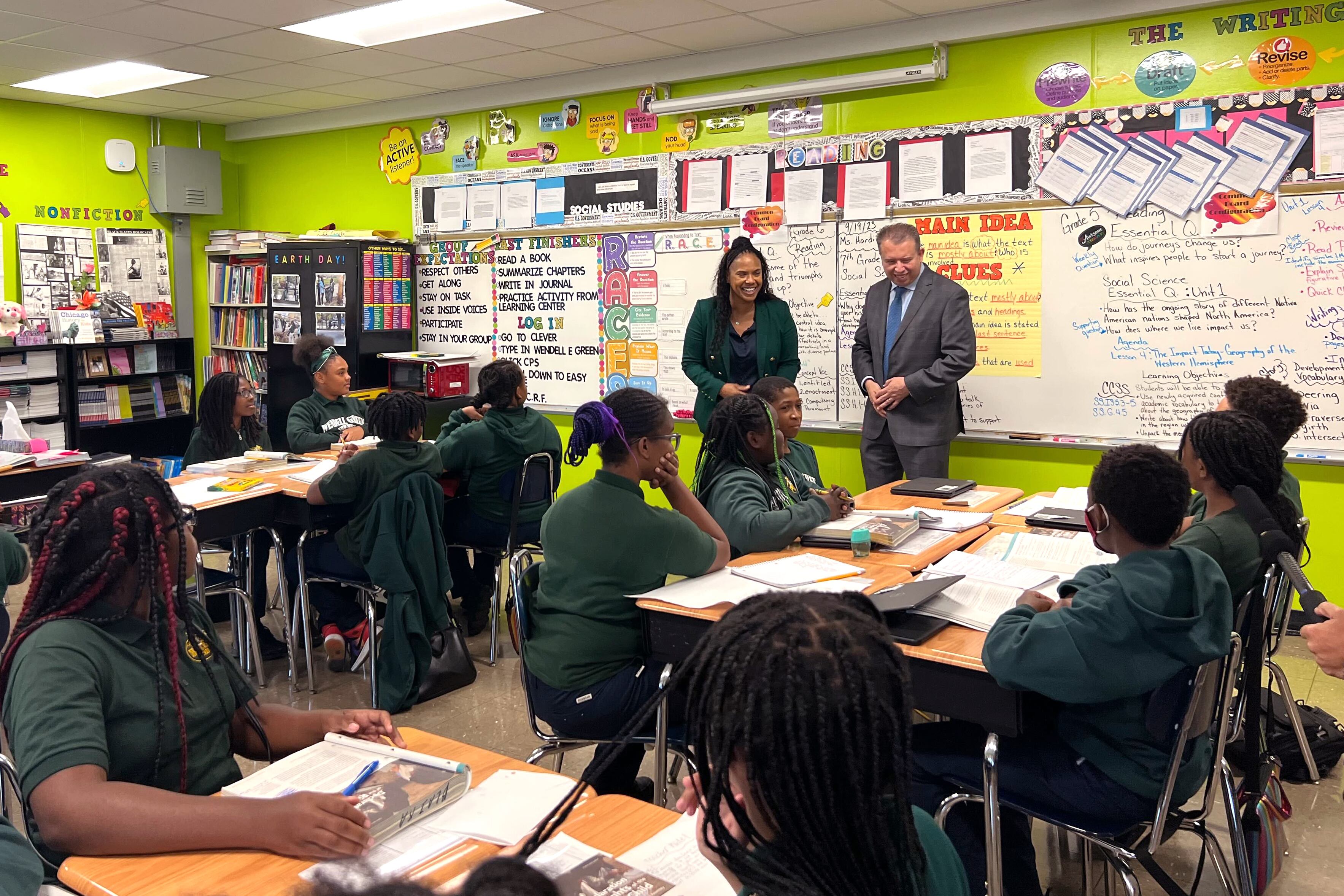Sign up for Chalkbeat Chicago’s free daily newsletter to keep up with the city’s public school system and statewide education policy.
At Wendell Green Elementary School on Chicago’s South Side, three girls studied a subtraction problem on the dry erase board. The answer would tell their combined third and fourth grade class how many rooms were vacant in an imaginary hotel.
How much is 224 minus 176?
The girls quickly realized they had to subtract seven from two in the middle column. How’s that possible if seven is bigger than two?
“What’s our saying?” their teacher asked, directing them to a chart on the other side of the room that listed rules for long subtraction.
“More on the top, no need to stop,” the girls said, reading the chart.
Did this match their situation, their teacher asked? No, the girls replied.
“So, what do we say?” the teacher said.
“More on the floor, go next door to get ten more,” the girls said in unison — referring to the borrowing rule of long subtraction.
This scene on Tuesday was one example of how Green’s teachers walk students through complicated lessons — and how doing so has helped boost state test scores at the school, said the school’s principal, Tyrone Dowdell. At Green, math pass rates grew from 5.5% in 2019 to 9.4% in 2023, and reading pass rates nearly tripled in that time.
Green is not the only school to show improvement. More elementary-aged students in Chicago Public Schools met state reading and math standards on the 2023 Illinois Assessment of Readiness than did the previous school year, according to official data revealed Tuesday.
But the numbers citywide for third through eighth graders have still not reached pre-pandemic levels at most schools.
Of nearly 500 elementary schools in CPS, nearly 200 schools — including Green — saw the portion of students who met reading standards on the 2023 state test match or surpass the portion who met them in 2019, according to a Chalkbeat analysis of district data. For math, just over 50 schools saw a return to pre-pandemic levels. Most schools saw improvements over their results from the 2021-22 school year.
Overall, about 26% of students met or exceeded reading standards on the 2023 test, compared with 27.3% in 2019. For math, 17.5% of students passed, compared with 23.6% in 2019.
The Illinois Assessment of Readiness is required for all third through eighth grade students and administered every spring. The test was cancelled in 2020, as schools shut down amid the early days of the COVID-19 pandemic. The following year, after a year of virtual and hybrid learning, the percentage of students who met or exceeded standards dropped across the board in both reading and math.
On Tuesday, CPS CEO Pedro Martinez noted that “progress does not happen overnight,” but called the new data “extremely promising” while at Green to announce the test score results.
The data mirrors what Chalkbeat reported in August after obtaining an early look at districtwide results. The numbers unveiled Tuesday show school-level data, which includes more detailed test score information by grade.
The test results were “evidence that our strategies are working,” Martinez told reporters. In a press release, officials noted “strong growth” among Asian American and Black students. Still, disparities remain.
For reading, more Asian American, multiracial, and white students met or exceeded standards than Hispanic and Black students. Math scores showed similar results, but greater gulfs.
Fewer students with disabilities, those learning English as a new language, and those who are from low-income households met or exceeded standards as well.
Martinez and Bogdana Chkoumbova, the district’s chief education officer, touted several financial investments the district has made for classrooms, including adding counselors and interventionists to catch students up after COVID. But many of those investments depend on federal COVID relief dollars, which expire in 2024.
Asked if the district plans to continue investing in those programs, Martinez said he will use test score growth as one way to “make the case” to state lawmakers to boost funding even further for Chicago Public Schools.
Paul Zavitkovsky, an assessment specialist at the Center for Urban Education Leadership at the University of Illinois Chicago, said the scores of third graders are a bellwether for the district.
“A lot of the gas that goes into the tank for fourth, fifth, sixth, seventh and eighth grade comes from the foundation of stuff that kids are bringing with them coming out of third grade,” Zavitkovsky said, noting that this year’s third graders were in kindergarten when the pandemic hit.
On reading, 19.7% of Chicago third graders met or exceeded standards on the 2023 test, while nearly 21% of them passed math.
Martinez said CPS, like other districts, is facing challenges in math achievement. Many of the district’s coaches and tutors focus on literacy, but the district is now thinking about how they can provide more support in math instruction, Chkoumbova said.
At Green Elementary, nearly one-third of students met or exceeded reading standards, and just over 9% passed math.
The school hired a coach who helps teachers use data, such as from test scores, to develop the best strategies in classrooms. Dowdell, the principal, also believes the school’s growth came out of an increased focus on writing and using specific vocabulary words from state standards in class.
Dowdell said students are learning how to problem-solve together. He pointed to the girls who worked through the problem during math class as a moment of “authentic struggle.”
It’s one of the strategies, Zavitkovsky noted, that’s been helping schools bounce back from the pandemic.
“Part of learning is that you’ve got to struggle with stuff that you don’t get right away, and a good way to do that struggling is to link up with other people so you can do that struggling together… and come out the other end feeling smarter, and more confident,” he said.
It’s a strategy the district could use as it continues the difficult work of recovery.
“We’ve got some serious challenges,” Zavitkovsky said. “But this is an opportunity for us to really push ourselves.”
Reema Amin is a reporter covering Chicago Public Schools. Contact Reema at ramin@chalkbeat.org.
Becky Vevea is the bureau chief for Chalkbeat Chicago. Contact Becky at bvevea@chalkbeat.org.






